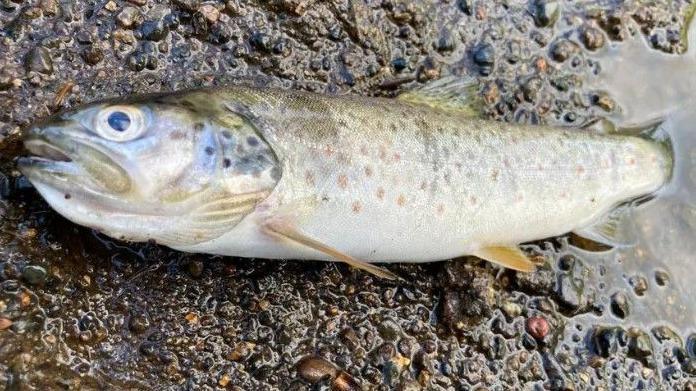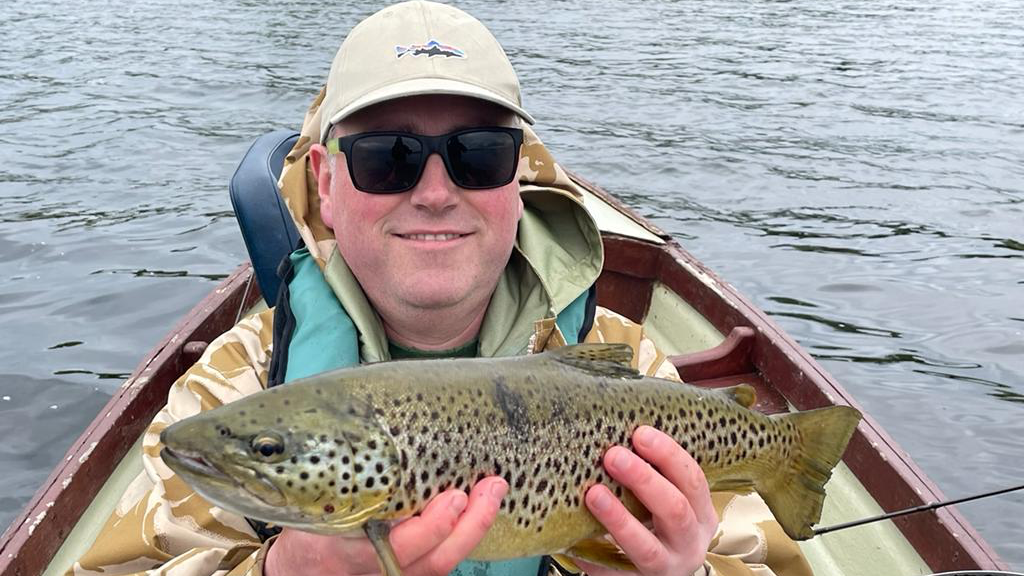Fish kills threaten 'delicate ecosystems'

Brown trout are among the species being found dead
- Published
In recent weeks, thousands of fish have been killed in various stretches of river across Northern Ireland.
There have been four major fish kills within the last four weeks.
More than a thousand brown trout were killed in the Four Mile Burn, a tributary of the Six Mile Water river in County Antrim on 19 May.
Then on 5 June, Inland Fisheries Ireland (IFI) said more than 300 fish had been killed in a pollution incident in the Skeoge River near Donegal.
Anglers described a fish kill on Antrim's Glenavy River on 13 June as "harrowing", while an unrelated pollution incident three days later in the River Roe at Burnfoot resulted in more than 700 dead fish floating on the surface.
While one specific cause cannot be directly attributed, Joanna Braniff from The Rivers Trust said fish kills were being driven by a number of factors including "chemical pollution, sewage spills and discharge overflows, increased water temperatures, and low oxygen levels caused by climate change and heavy rainfall running fertilisers off fields."

Joanna Braniff highlights that these fish kill incidents have a wider ripple effect on our delicate ecosystems
'Akin to a forest fire'
Ms Braniff said that events like these "undo decades of dedicated conservation work."
"The death of thousands of fish in these incidents is a tragedy, not just for wildlife and biodiversity, but also the local communities who depend on them for recreation and their livelihoods."
Ms Braniff highlights the long-term "devastating" impacts of such fish kills on the wider ecosystem.
"Impacts on fish breeding can wipe out entire species in a river, affecting birds, insects, and other river fauna and flora that depend on them, destroying an interconnected biodiversity web."
"A fish kill is akin to a forest fire in terms of the damage it causes," she added.

Gary Houston, from Tandragee, has been the chairman of the Ulster Angling Federation three years
'Some rivers will never recover'
Ms Braniff said she is concerned that people are becomming immune to the sight of polluted waterways in Northern Ireland.
Similarly, Gary Houston, chairman of the Ulster Angling Federation pointed out that while it doesn't take much to cause a fish kill, "there are far too many of these incidents in Northern Ireland now."
"Our waters are such poor quality, and because the management of agricultural waste is not controlled well enough, some of our rivers never get that chance to recover.
"Our rivers are polluted all the time," he added.
When asked how Northern Ireland compares to the rest of the UK and Ireland, Mr Houston told BBC News NI that "we are at the bottom."
"It comes down to regulation.
"There is really bad enforcement policy and low penalty rate for these types of offences, its just a free for all," he said.
'Get out of jail free card'
Mr Houston highlighted that as part of a "'statement of regulatory principle', NI Water cannot be penalised generally because it's infrastructure is not fit for purpose.
"So it's like a get out of jail free card," he added.
According to NI Water, more than 20 million tonnes of untreated sewage and wastewater is being spilled into Northern Ireland's waterways annually.
Mr Houston said the combination of agricutural run-off, and the dumping of raw sewage in Northern Ireland's waterways is killing the sport of angling.
"Angling is a key sport in Northern Ireland, we have over 7,000 members and there is some 37,000 registered anglers in Northern Ireland.
"We are fighting an uphill battle," he said.
The Department of Agriculture and Rural Affairs (daera) have been contacted for comment.